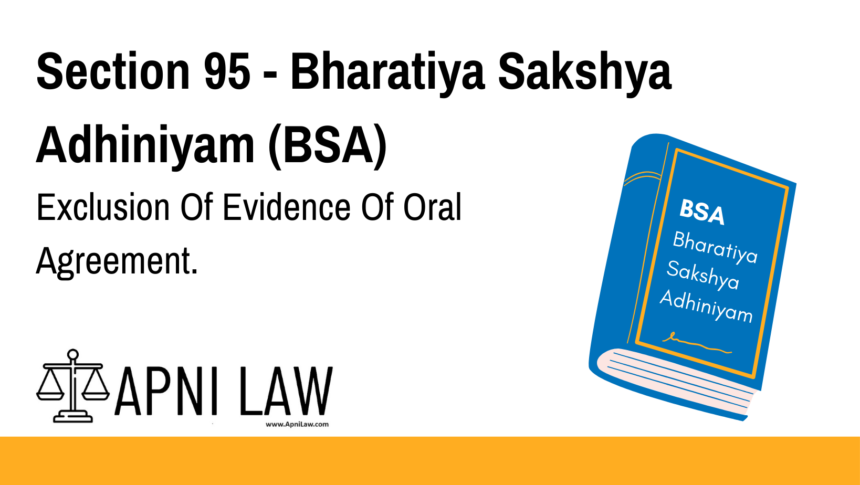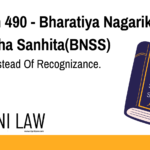Code: Section 95 – Bharatiya Sakshya Adhiniyam, 2023
When the terms of any such contract, grant or other disposition of property, or
any matter required by law to be reduced to the form of a document, have been proved
according to section 94, no evidence of any oral agreement or statement shall be admitted,
as between the parties to any such instrument or their representatives in interest, for the
purpose of contradicting, varying, adding to, or subtracting from, its terms:
Provided that any fact may be proved which would invalidate any document, or
which would entitle any person to any decree or order relating thereto; such as fraud,
intimidation, illegality, want of due execution, want of capacity in any contracting party,
want or failure of consideration, or mistake in fact or law:
Provided further that the existence of any separate oral agreement as to any matter on
which a document is silent, and which is not inconsistent with its terms, may be proved. In
considering whether or not this proviso applies, the Court shall have regard to the degree
of formality of the document:
Provided also that the existence of any separate oral agreement, constituting a condition
precedent to the attaching of any obligation under any such contract, grant or disposition
of property, may be proved:
Provided also that the existence of any distinct subsequent oral agreement to rescind
or modify any such contract, grant or disposition of property, may be proved, except in
cases in which such contract, grant or disposition of property is by law required to be in
writing, or has been registered according to the law in force for the time being as to the
registration of documents:
Provided also that any usage or custom by which incidents not expressly mentioned
in any contract are usually annexed to contracts of that description, may be proved:
Provided also that the annexing of such incident would not be repugnant to, or
inconsistent with, the express terms of the contract:
Provided also that any fact may be proved which shows in what manner the language
of a document is related to existing facts.
Illustrations.
(a) A policy of insurance is effected on goods “in ships from Kolkata to
Visakhapatnam”. The goods are shipped in a particular ship which is lost. The fact that
particular ship was orally excepted from the policy, cannot be proved.
(b) A agrees absolutely in writing to pay B one thousand rupees on the
1st March, 2023. The fact that, at the same time, an oral agreement was made that the money
should not be paid till the 31st March, 2023, cannot be proved.
(c) An estate called “the Rampur tea estate” is sold by a deed which contains a map
of the property sold. The fact that land not included in the map had always been regarded
as part of the estate and was meant to pass by the deed cannot be proved.
(d) A enters into a written contract with B to work certain mines, the property of B,
upon certain terms. A was induced to do so by a misrepresentation of B’s as to their value.
This fact may be proved.
(e) A institutes a suit against B for the specific performance of a contract, and also
prays that the contract may be reformed as to one of its provisions, as that provision was
inserted in it by mistake. A may prove that such a mistake was made as would by law entitle
him to have the contract reformed.
(f) A orders goods of B by a letter in which nothing is said as to the time of payment,
and accepts the goods on delivery. B sues A for the price. A may show that the goods were
supplied on credit for a term still unexpired.
(g) A sells B a horse and verbally warrants him sound. A gives B a paper in these
words—”Bought of A a horse for thirty thousand rupees”. B may prove the verbal warranty.
(h) A hires lodgings of B, and gives B a card on which is written—”Rooms, ten
thousand rupees a month”. A may prove a verbal agreement that these terms were to
include partial board. A hires lodging of B for a year, and a regularly stamped agreement,
drawn up by an advocate, is made between them. It is silent on the subject of board. A may
not prove that board was included in the term verbally.
(i) A applies to B for a debt due to A by sending a receipt for the money. B keeps the
receipt and does not send the money. In a suit for the amount, A may prove this.
(j) A and B make a contract in writing to take effect upon the happening of a certain
contingency. The writing is left with B who sues A upon it. A may show the circumstances
under which it was delivered.
Explanation of Section 95 BSA
Section 95 of the Bharatiya Sakshya Adhiniyam deals with the admissibility of oral evidence when the terms of a contract, grant, or disposition of property are reduced to writing. Once the terms have been proved through valid documentation as per Section 94, no oral statement is admissible to alter those terms, except under specific exceptions.
Key Takeaways:
-
Written terms cannot be contradicted or varied by oral agreements.
-
Several exceptions exist allowing oral evidence in limited and justified scenarios.
-
Protects the integrity of written contracts while ensuring justice where fraud, coercion, or mistakes occur.
Illustrations
-
A marine insurance policy states goods will be shipped from Kolkata to Visakhapatnam. An oral agreement claiming exclusion of a particular ship cannot be proved.
-
A agrees in writing to pay B ₹1,000 on March 1, 2023. Oral evidence that payment is actually due on March 31 is inadmissible.
-
A deed includes a map of an estate. Oral evidence cannot be introduced to expand the area of the estate beyond what’s shown in the map.
-
A is misled by B about the value of mines and enters a written agreement. A may prove misrepresentation to challenge the validity of the contract.
-
A contract contains an error in one clause due to a mistake. Oral evidence may be introduced to support reformation of the contract.
-
A orders goods but the letter does not mention credit terms. A may show that the goods were delivered on credit.
-
A verbally warrants a horse is sound and gives a simple receipt. B may prove the verbal warranty.
-
A hires a room from B, and a card shows “Rooms ₹10,000 per month.” A may prove an oral agreement that the rent includes partial board.
-
A sends a signed receipt to B for a debt. B retains it without paying. A can prove this in court.
-
A written contract is left with B to take effect on a future event. A may prove the circumstances under which it was delivered.
Common Questions and Answers
Can oral statements change the terms of a written agreement?
Generally no, unless the case falls within one of the listed exceptions in Section 95.
What exceptions allow oral evidence to be admitted?
Oral evidence can be introduced to prove fraud, coercion, illegality, mistake, or where the contract is silent on a matter not inconsistent with its terms.
Can a later oral agreement change a written contract?
Yes, but only if the law does not require such modifications to be in writing or registered.
Are trade customs or usage admissible?
Yes, customary terms may be proved if they do not contradict the written agreement.
Can oral evidence explain ambiguous terms?
Yes, facts can be introduced to explain the relationship between language in the document and the surrounding circumstances.
Conclusion
Section 95 of the Bharatiya Sakshya Adhiniyam upholds the integrity of written contracts by restricting oral modifications while recognizing limited exceptions to ensure fairness and justice. It prevents manipulation of formal documents but offers leeway where genuine issues like fraud, mistake, or custom arise








